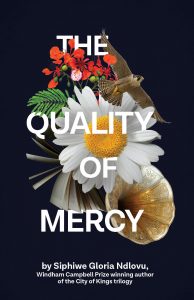Bridget Pitt Interviews Siphiwe Gloria Ndlovu
Tune into this conversation between two Catalyst Press authors: Bridget Pitt, whose North American debut novel Eye Brother Horn released this January, and Siphiwe Gloria Ndlovu, who was recently awarded the Windham Campbell Prize for her City of Kings trilogy, the third book of which (The Quality of Mercy) will be released by Catalyst Press in September. Books 1 and 2 are available now worldwide
Siphiwe is based in Bulawayo, Zimbabwe, and Bridget is based in Cape Town, South Africa.
—

Bridget Pitt
Bridget Pitt: Does writing feel different to you after having won such a major award? Any newfound freedoms or obstacles?
Siphiwe Gloria Ndlovu: The truth is that writing always feels different to me – each novel has its own character, its own set of challenges, its own moments of great joy, its own particular journey. Winning a major award does up the ante, I have to admit, because there may be more expectations and more attention. But I think the kindest thing I do for myself is focus on the story that I am currently writing and try not to let the successes or failures of previous works interfere with it. It is not always easy to do so and, admittedly, it has become not as easy as it was in the beginning. Some writers write for an audience, some writers write for themselves, some writers write for their characters – I write for my characters. Therefore, it is important to me to listen to the story and where the characters are taking me, for that to happen I have to immerse myself in the story world and in the story world I’m not a writer who has won major awards, I’m just a conduit receiving a story and the storyteller chosen to tell it.
BP: For readers who may not have much previous knowledge of Zimbabwe, your work may be their first exposure to the history of the country. Does that feel like a burden or a blessing to you?
SGN: I love history – its knottiness and its messiness – so any time I get to engage with it I’m just happy. The wonderful thing about being a Zimbabwean writer in this moment is that there are many of us writing and trying to reckon with or bring into sharper focus our country’s past and present. The fact that other writers such as Tsitsi Dangarembga, NoViolet Bulawayo, Novuyo Tshuma, Bryony Rheam and Sue Nyathi (just to name a few) are also writing stories that deal with Zimbabwe’s history makes it a blessing because my novels are in conversation with these other novels. There’s also a long tradition in Zimbabwean literature of writers writing about the country’s history – Yvonne Vera, Dambudzo Marechera, Shimmer Chinodya, Charles Mungoshi – I consider my work to be part of this tradition.
BP: Tell me about the writing culture in Bulawayo. Who is your writing community?

Siphiwe Gloria Ndlovu
SGN: Bulawayo is a fantastic city to write in. There are so many authors from Bulawayo – the late Yvonne Vera, NoViolet Bulawayo, Novuyo Tshuma, Sue Nyathi, Brian Chikwava – and so many authors writing in and around Bulawayo – John Eppel, Bryony Rheam, Violette Kee-Tui, C.M. Elliott and Susan Hubert. For a relatively small city, Bulawayo has a vibrant and thriving writing culture. It is definitely a city – with its Victorian architecture, wide tree-lined avenues, defunct industrial sites, uneven development, continued social racial segregation, complex colonial and postcolonial histories – that has many stories to tell and obviously many of us who currently live there or have lived there in the past are inspired to tell these stories. It brings me great joy to write about my city in such company.
BP: Who is the first person you trust to read your manuscripts? Is there someone you find yourself nervous to show it to?
SGN: It took me ten years to write my first novel, The Theory of Flight, and for the most part it was because I was figuring out how to write an extended piece of prose as I went along. For many years no one knew I was writing it and I rather liked having it all to myself. I was also struggling to write my PhD dissertation for some of those years so the time it took made some sense. But looking back I realise that I was not only writing a manuscript, but also protecting it from the world. My progress was slow because I didn’t have to be accountable to anyone but myself. I realised that if the manuscript was ever to be finished then the healthy thing to do was to be part of a writers’ group so that I could share what I was writing. This would accomplish two important things – it would make me accountable to others and make me less anxious about receiving feedback on my writing. After I summoned enough courage to finally send out my manuscript to publishing houses, I discovered that there was this wonderful thing called a reader’s report (or reader’s notes) that allowed you to see your manuscript through another person’s eyes. I love reader’s reports and the entire editorial process and have been extremely blessed and fortunate enough to work with phenomenal editors – Jenefer Shute, Helen Moffett, Fourie Botha and Catriona Ross – on the City of Kings trilogy. My experience with The Theory of Flight taught me a great lesson – as a writer, you need to trust the process. That said, I would never ever show a first draft of my manuscript to anyone, not even my mother.
BP: The Theory of Flight contains most of the elements of the stories which feature in the following two books. Did you know you would develop these strands into a trilogy from the beginning? Or did that urge come to you as you were writing the first book?
SGN: No, in the beginning I really didn’t know that I would write a trilogy that is this interconnected. I guess I spent so much time with the characters of The Theory of Flight that I couldn’t imagine their stories ending with the novel’s end and so I found a way to continue the story. The lucky thing was that as I was writing The Theory of Flight I also had the ideas for what would become The History of Man and The Quality of Mercy. Once Emil Coetzee, the protagonist in The History of Man appeared as a minor character in The Theory of Flight, the proverbial lightbulb went off in my head and the rest, as they say, is history.
BP: I know you’re busy working on something at the moment, can you tell me a bit about it?
SGN: There is, of all things, a neo-Medieval castle two houses from where I live in Bulawayo. That, as a writer, it never occurred to me, until fairly recently, to use that castle as a setting for one of my stories, is both a mystery and a great disappointment to me. I am currently rectifying that by writing a Gothic novel.
BP: Your narratives are imbued with entanglement and complexity, yet also illuminated by redemptive imagery which guides the story through these thickets. I feel in them a refusal to allow the redaction of stories to villain and victim, guilt and innocence. Do you feel it’s important to reflect complexity and nuance when exploring difficult histories? How do you manage to hold both complexity and clarity?
SGN: I think the current state of the world answers a part of this question for me. We are witnessing and living through what happens when people refuse to empathise with others, when people doggedly hold on to their myopic views and narrow understanding of the world, when people choose to live in fear of what is different. This usually happens when we have centred our narratives as the only ones that matter. I prefer to look at history through both a long lens and a wide lens. As I said before, history is messy and knotty – it doesn’t reveal clear cut villains and victims, it reveals the tangled web created by humans striving to survive (personally, politically, economically, socially, etc.) and doing whatever it takes to keep on surviving. When you realise that at the heart of all that entanglement is the same desire, then nuance becomes key when telling the story.
BP: The title of the third book in your trilogy is The Quality of Mercy, and the term ‘mercy’ plays out in different ways in the text. What does mercy mean to you? What is its quality? Is it important to you as a writer narrating the troubled stories of your country’s past and present?
SGN: Mercy for me is something more than forgiveness – it is having both the capacity to forgive and making the choice to forgive. There is a sense of kindness and generosity imbued in the word. It is not just an action, it is a gift. This gift requires that the giver understand and see the humanity of the receiver. Empathy is what is at the heart of mercy and that is its greatest quality. Mercy is what allows for the nuance and the ability to hold both complexity and clarity that you referred to in your previous question.
BP: In The Theory of Flight, you revisit the image of the elephants swimming across the Zambezi, how contemplating the wonder of this sight can make you realise you are just a tiny speck, and how this is ‘the kind of knowledge that finally allows you to fly’. Do you think story telling and story listening can bring this sense of wonder and freedom? Is this something you strive for in your stories?
SGN: The wonderful thing about stories is that they allow us to see the world, situations and circumstances through others’ eyes. If you read widely then you start encountering other perspectives and ways of being. The idea is that these different perspectives and ways of being then allow you to see the brilliant diversity of the world. This, ideally, would be a freeing thing, but I’m aware it may not be that for everyone. Through presenting different perspectives in my work and writing of a world that is full of assorted possibilities, I hope to create some of that sense of wonder and freedom.
—
Siphiwe Gloria Ndlovu is a writer, filmmaker and academic who holds a PhD in Modern Thought and Literature from Stanford University, as well as master’s degrees in African Studies and Film. She has published research on Saartjie Baartman and she wrote, directed and edited the award-winning short film Graffiti. Born in Bulawayo, Zimbabwe, she worked as a teacher in Johannesburg before returning to Bulawayo. Her first novel, The Theory of Flight won the Barry Ronge Fiction Prize in South Africa. In 2022, Siphiwe was awarded a Windham-Campbell Prize for Fiction. Catalyst Press is set to release the third book in Siphiwe’s City of Kings Trilogy, The Quality of Mercy, in September 2023. Books 1 and 2 in the series, The Theory of Flight and The History of Man, are available now at www.catalystpress.org.
Bridget Pitt is a South African author and environmental activist who has published poetry, short fiction, non-fiction and three novels (Unbroken Wing, Kwela, 1998; The Unseen Leopard, Human & Rousseau, 2010; Notes from the Lost Property Department, Penguin, 2015). Two were long-listed for the Sunday Times Literary Awards. Her second novel was shortlisted for the Commonwealth Book Prize (2011) and the Wole Soyinka African Literature Award (2012). She has recently co-authored a memoir of the spiritual wilderness guide, Sicelo Mbatha (Black Lion: Alive in the Wilderness, Jonathan Ball, 2021). Her short fiction has received a Commonwealth nomination and has been published in anthologies in South Africa, Canada, and the United Kingdom. Eye Brother Horn is her North American debut and is available now at www.catalystpress.org.
Follow Catalyst Press on Facebook, Instagram and Twitter for more on these authors and their upcoming work.
THE QUALITY OF MERCY
 On the eve of his country’s independence, Spokes Moloi investigates his first ‘white case’ and finds a very confusing crime scene. Having recently been promoted to Chief Inspector, it is up to Spokes – a man of impeccable rectitude and moral spotlessness who is supported in all things by his paragon spouse, Loveness – to solve long-standing mysteries. His task now is to unravel the alleged murder of a man, Emil Coetzee, but also the tangled web that his life created.
On the eve of his country’s independence, Spokes Moloi investigates his first ‘white case’ and finds a very confusing crime scene. Having recently been promoted to Chief Inspector, it is up to Spokes – a man of impeccable rectitude and moral spotlessness who is supported in all things by his paragon spouse, Loveness – to solve long-standing mysteries. His task now is to unravel the alleged murder of a man, Emil Coetzee, but also the tangled web that his life created.
Following on her award-winning novels The Theory of Flight and The History of Man, Siphiwe Gloria Ndlovu’s The Quality of Mercy is a novel of comfort and, indeed, mercy. Ndlovu weaves together elements of social comedy and cosy crime while examining the history of a country transitioning from a colonial to a postcolonial state. From the City of Kings and surrounding villages steps a cast of engaging characters who will criss-cross each other’s lives in delightful and poignant ways. Here, where everyone knows everyone else, the ties of kinship and affiliation can never be completely broken.
BUY HERE
Category: Interviews, On Writing

























I have discovered Siphiwe Ndlovu this weekend at the brilliant FRANSCHOEK LITERRY FESTIVAL. What a find.
Your interview is remarkable.
How do I subscribe?